I made some new measurements at around 80db. I think I need a bigger test amp to go louder.
I figured out SE's measurement system and if you keep the "raise by x db" value the same as the "raise x db" for harmonics the same you can see the harmonics relative to the signal without doing any math.
The SPL scale isn't calibrated. I measured the sweep with my old Radio Shack sound level meter. That's why I said it was roughly 80db. I just ignore the SPL which can be adjusted anywhere in SE and look at the graphs relative to each other.
I currently have these speakers in the living room setting on a pair of bar stools. They needed some proper stands.
I started with tops and bottoms with the last of my 3/4" Baltic birch.
Duratex for the tops.
Gluing up the posts from Sapele and Maple hardwood.
Finished posts.
I made a drilling template to use to drill all the holes in the posts and tops and bottoms.
I have a dedicated 45 degree backstop that I screw to my panel cutting sled. If I need a different angle I fasten a backstop with double sided tape so I can cut the hardwood trim for the bases.
I veneered the bases and put a coat of Watco Danish oil on them and started gluing on the trim.
Gluing on more trim.
Framed base.
Test assembly with 3" deck screws.
Routed holes for the terminals. The speaker cable will run up the center of the post and out a small notch cut in the back of the post.
Finishing the bases.
Finishing the bottoms of the bases.
I should be able to put a couple coats of poly on next week and they'll be ready to go.
Ron, I’m considering using the DCS205’s in a smallish sealed format (in a 3 way with an open backed 6.5 inch coax, and a bit of eq). I’ll be bi-amping (coax with passive, woofer to coax active - my goto set-up) and I was wondering how your experience with these woofers has been, and how do they react/ sound when pushed a bit?
I really like this woofer. I'm running it with a 35 w/ch receiver so I never push it real hard but in a my ported box the bass gets down there.
I'm actually putting an active sealed system together for my BIL using this woofer. He's going to build the cabinets and I'll handle the rest. I've run some numbers and built a test box.
This is my sim for 3/4 cu. ft. with 150 watts in.
This is spreadsheet for a Linkwitz transform that I'll try using a MiniDSP 2x4HD.
The plan is for a TWW using the big Heil AMT1 driver, MiniDSP and 6 channels of a 75 w/ch Onkyo surround receiver. I bought the woofers for $64 each when PE was having a 15% off deal and I got a break for buying 4. I picked up the Heil's when they were 1/2 off. My BIL seems to be in no hurry to build cabinets.
I'm actually putting an active sealed system together for my BIL using this woofer. He's going to build the cabinets and I'll handle the rest. I've run some numbers and built a test box.
This is my sim for 3/4 cu. ft. with 150 watts in.
Ron
Excellent info- thanks !
With 6 channels, thoughts on the lower second W running as a .5?
This link explains what the software does and how to enter it into the Minidsp. One thing I would add to that is that you can get F3 and system Q using DATS if you have one.
I had not considered running one of the woofers as a .5.
One thing I would add to that is that you can get F3 and system Q using DATS if you have one.
Won't DATS give the box tuning? Would it also take into account the transform? Not sure how to take DATS measurment with MiniDSP. Usually I takea DATS measurement after putting in the drivers in the box, stuffing and ports to see if the valley is similar to the box desing. Are you looking at doing something else with DATS?
One thing I would add to that is that you can get F3 and system Q using DATS if you have one.
Won't DATS give the box tuning? Would it also take into account the transform? Not sure how to take DATS measurment with MiniDSP. Usually I takea DATS measurement after putting in the drivers in the box, stuffing and ports to see if the valley is similar to the box desing. Are you looking at doing something else with DATS?
I was pointing out that you could measure F3 and Q to use in the spreadsheet instead of trying to estimate them by comparing the FR to the graph supplied in the writeup. You verify that the transform is working by measuring the FR with and without the transform.
I have played around with the Minidsp and the test box. This is the NF FR with and without EQ. It's not right because I needed to include BSC and I didn't but you get the idea.
Comments
I made some new measurements at around 80db. I think I need a bigger test amp to go louder.
I figured out SE's measurement system and if you keep the "raise by x db" value the same as the "raise x db" for harmonics the same you can see the harmonics relative to the signal without doing any math.
Ron
Let me also state, that the fundamental FR should be 90-95dB, not the distortion plots. It looks like 110dB there.
That should be plenty...
InDIYana Event Website
The SPL scale isn't calibrated. I measured the sweep with my old Radio Shack sound level meter. That's why I said it was roughly 80db. I just ignore the SPL which can be adjusted anywhere in SE and look at the graphs relative to each other.
I currently have these speakers in the living room setting on a pair of bar stools. They needed some proper stands.
I started with tops and bottoms with the last of my 3/4" Baltic birch.
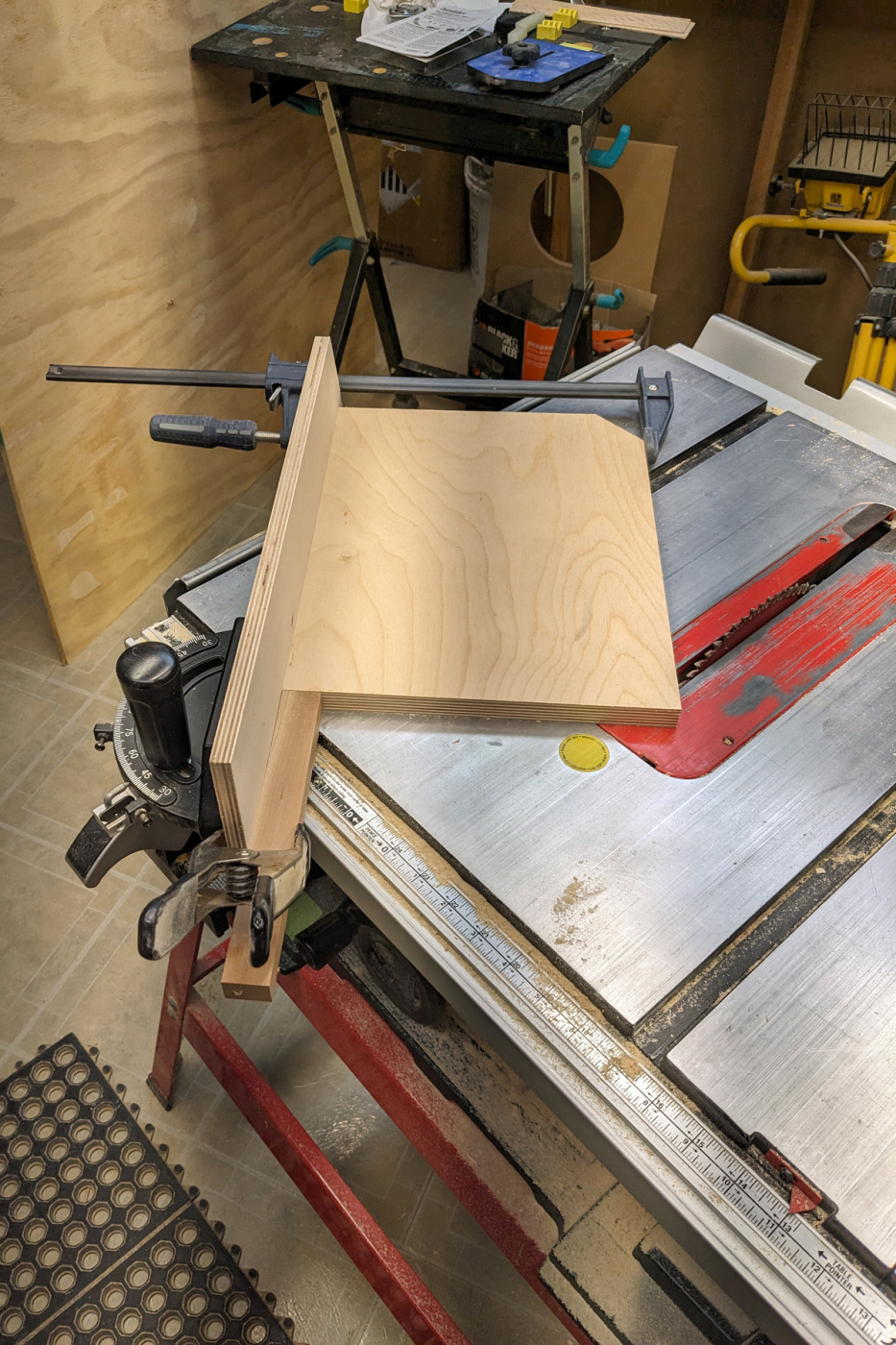
Duratex for the tops.
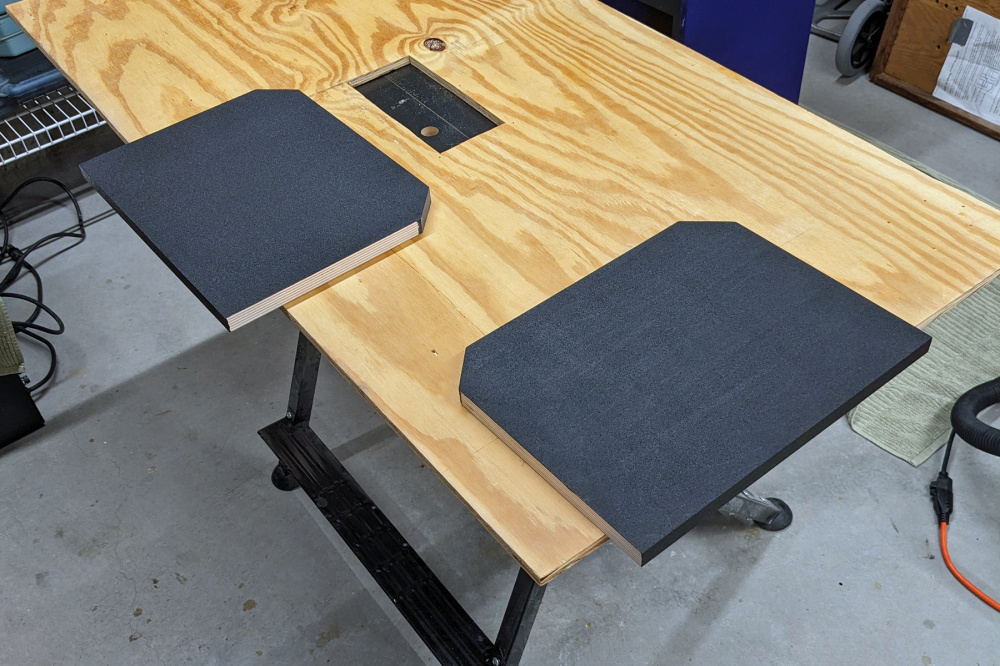
Gluing up the posts from Sapele and Maple hardwood.
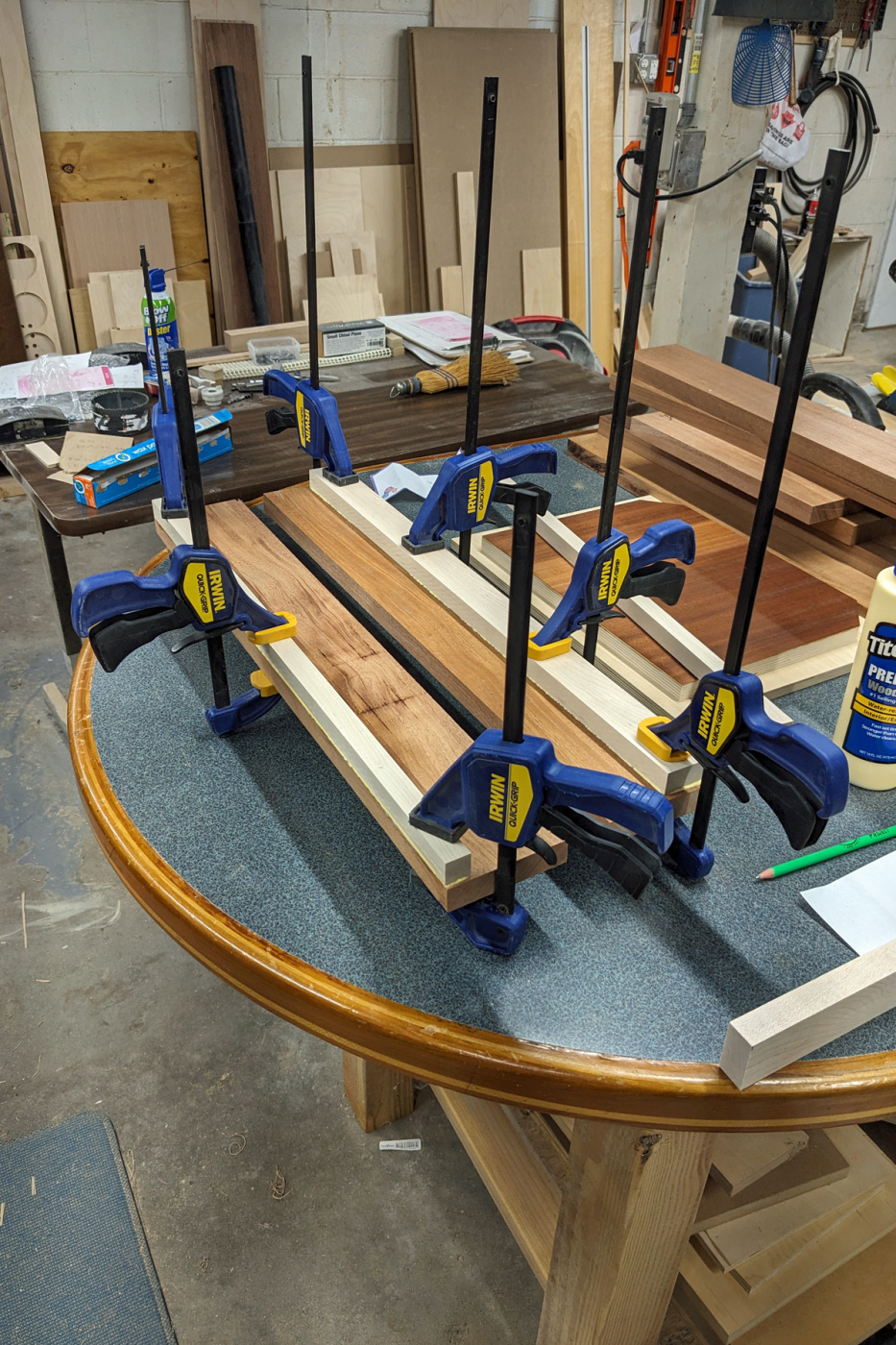
Finished posts.
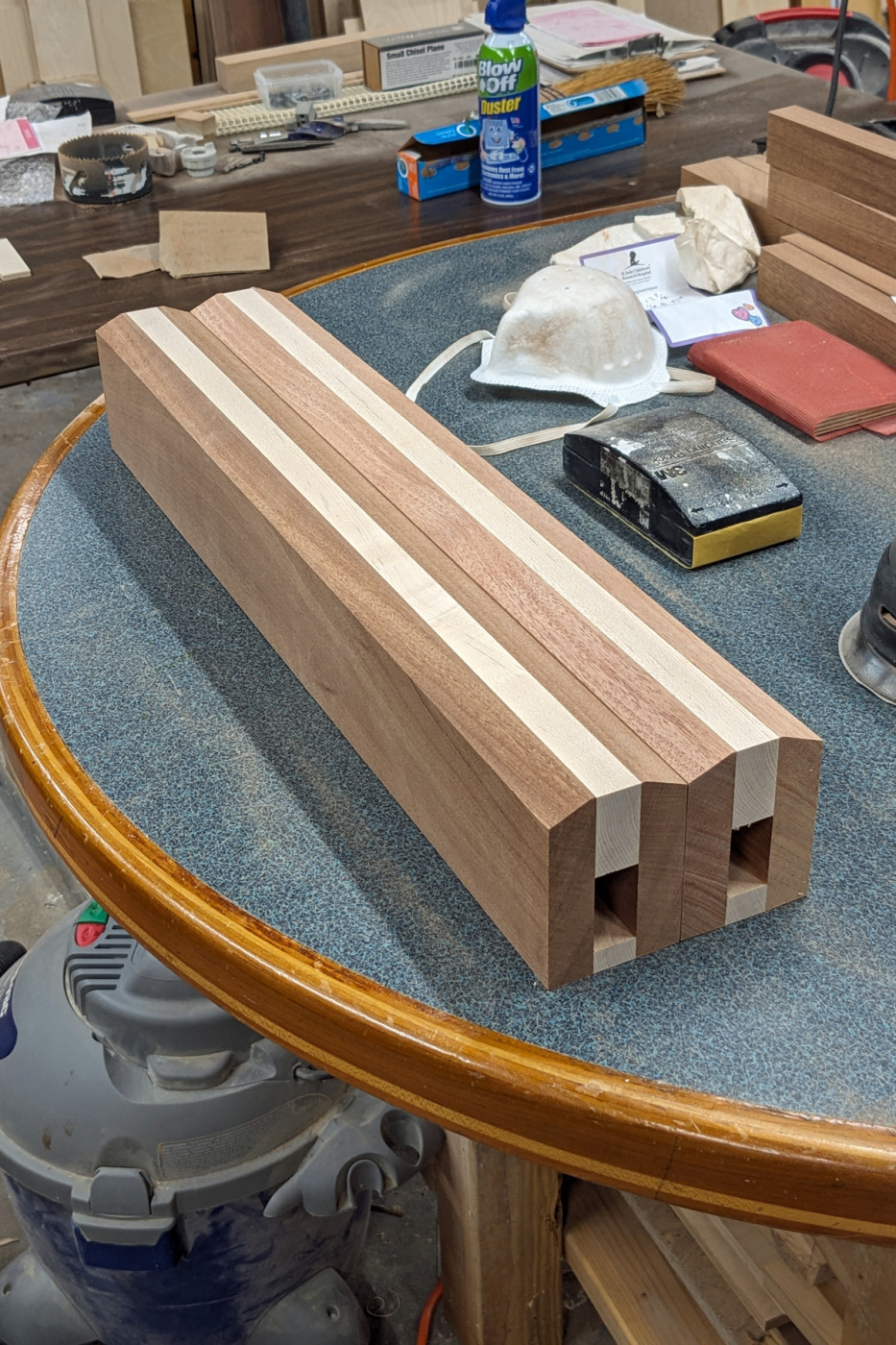
I made a drilling template to use to drill all the holes in the posts and tops and bottoms.
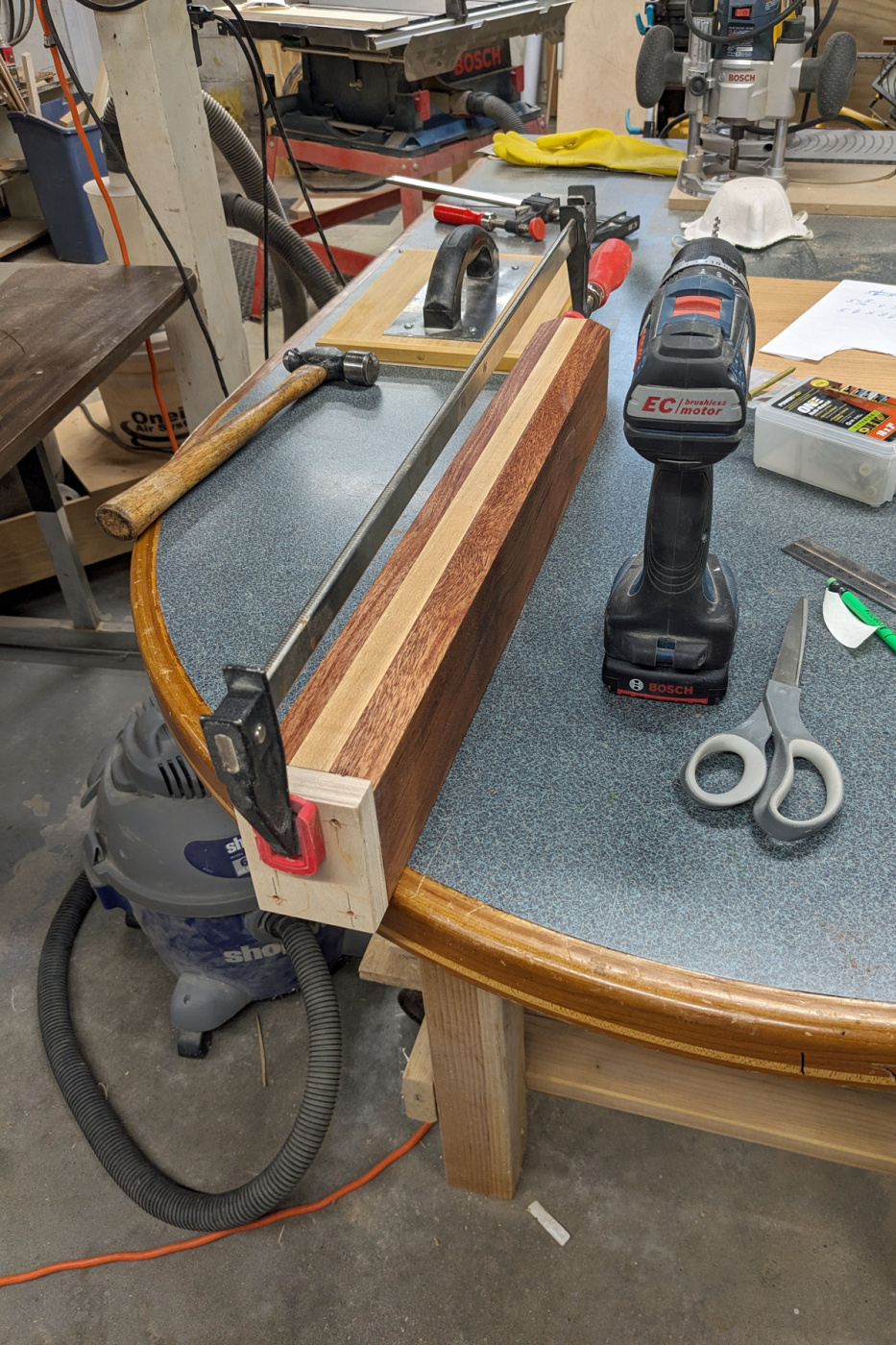
I have a dedicated 45 degree backstop that I screw to my panel cutting sled. If I need a different angle I fasten a backstop with double sided tape so I can cut the hardwood trim for the bases.
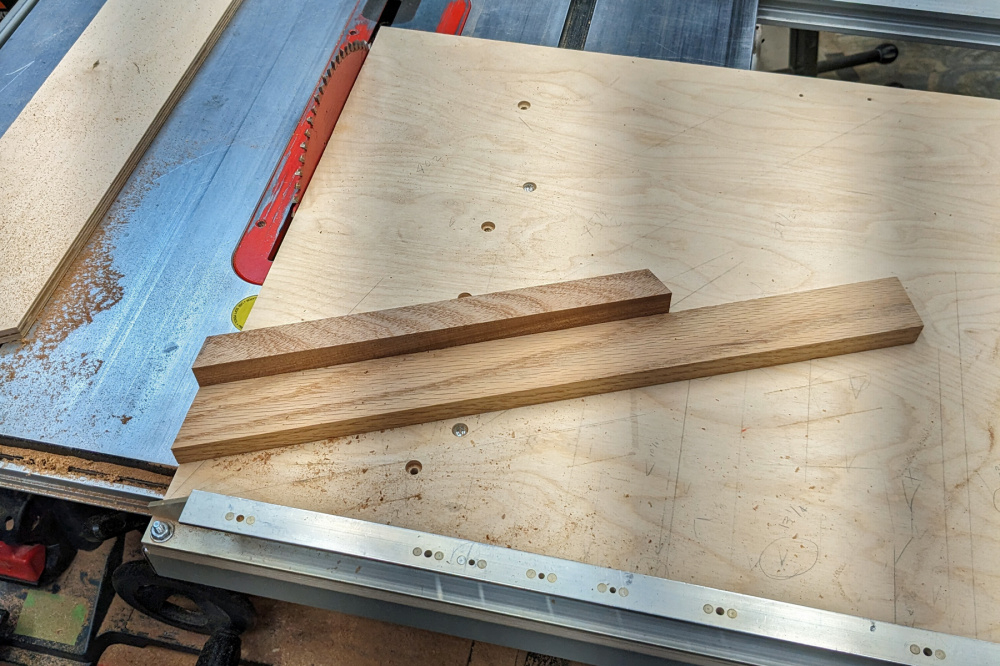
I veneered the bases and put a coat of Watco Danish oil on them and started gluing on the trim.
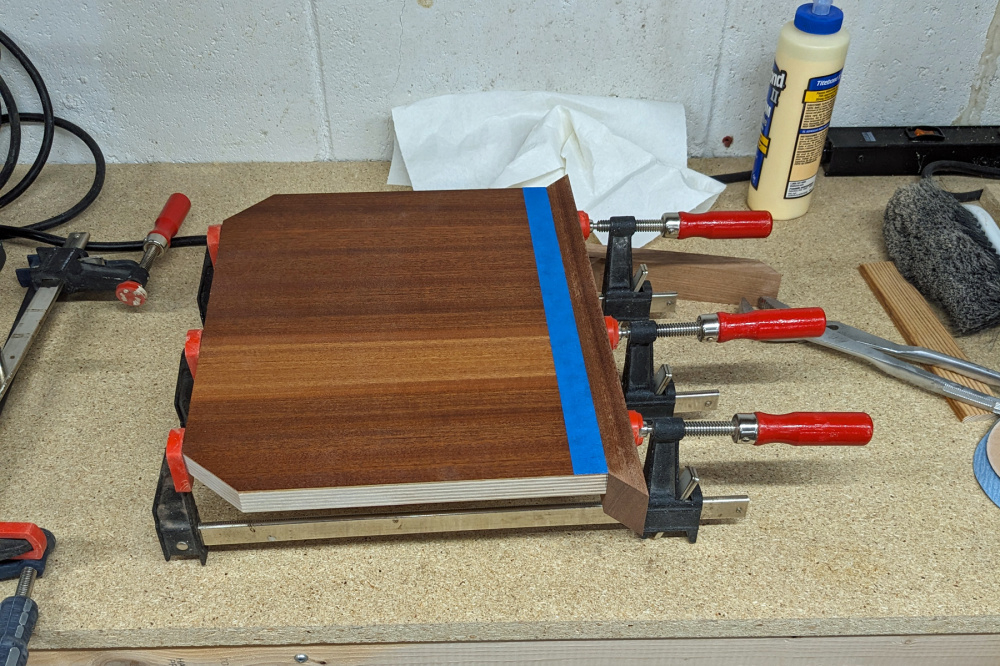
Gluing on more trim.
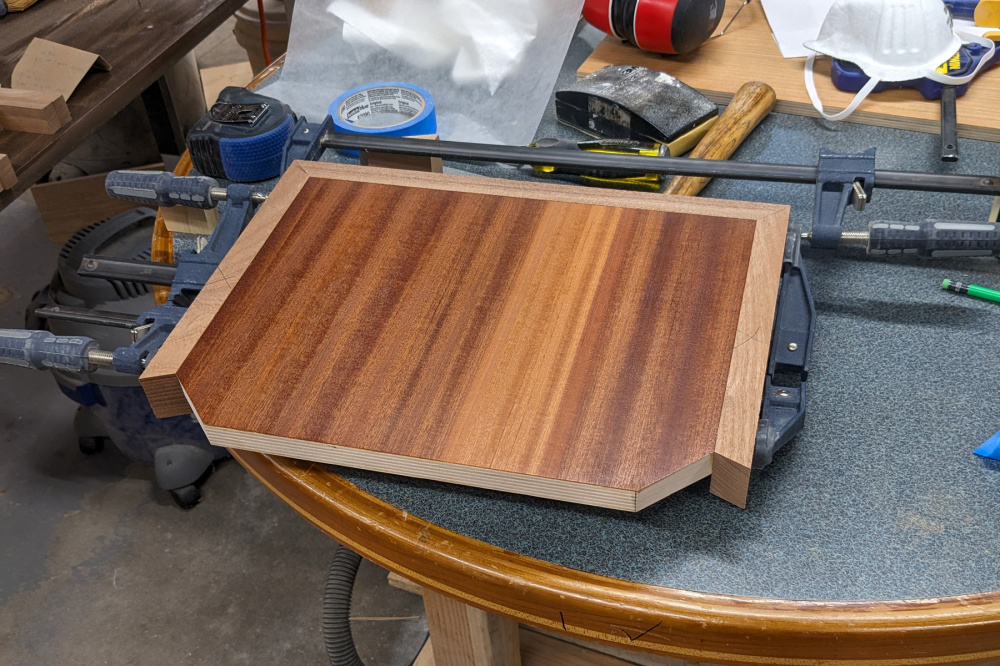
Framed base.
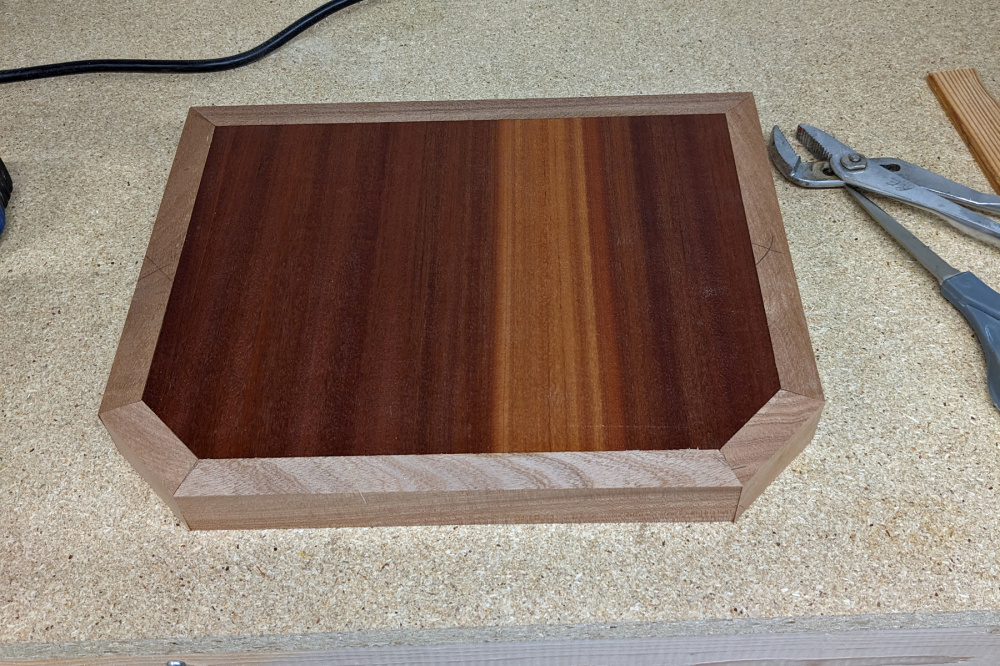
Test assembly with 3" deck screws.
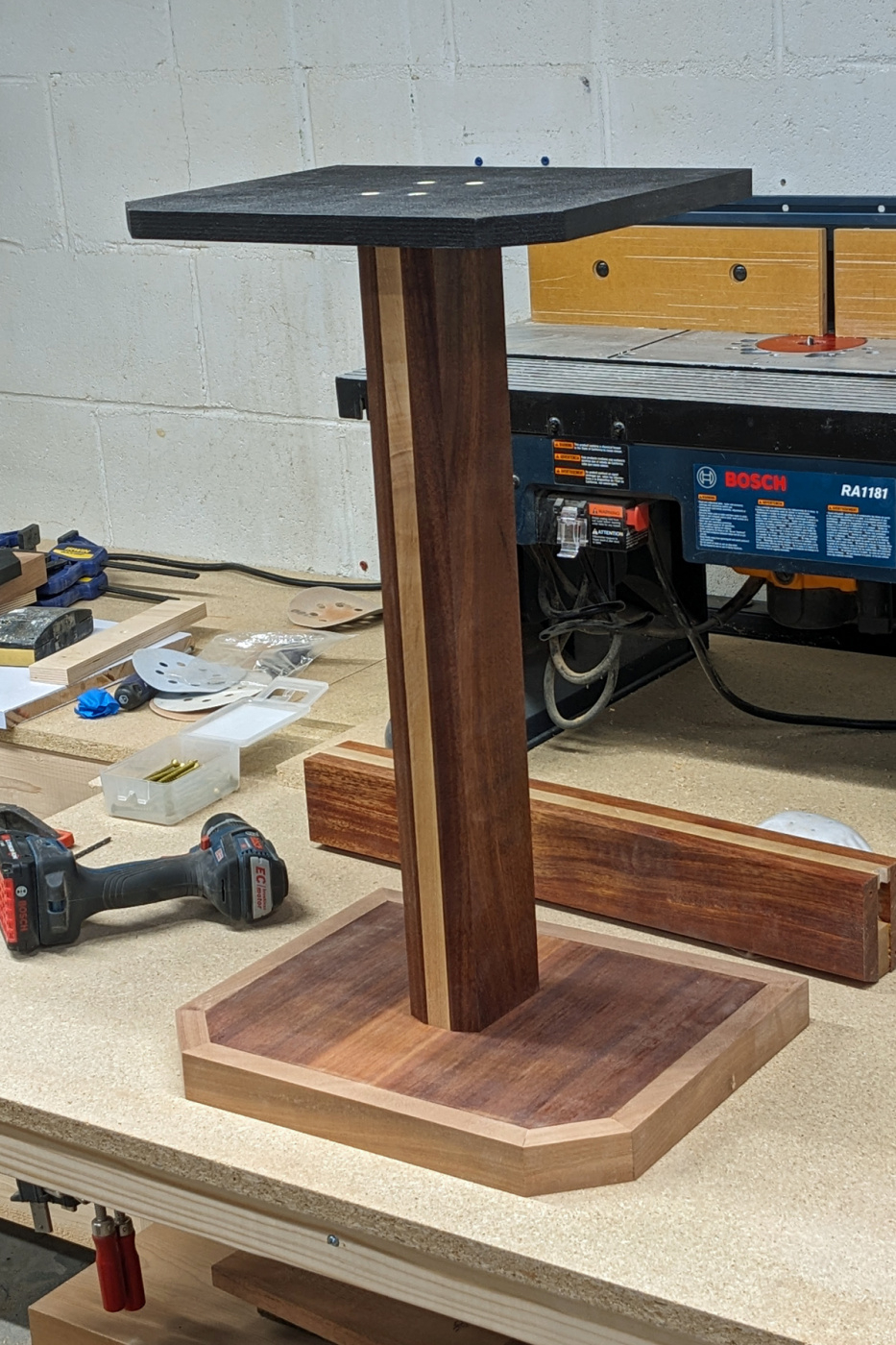
Routed holes for the terminals. The speaker cable will run up the center of the post and out a small notch cut in the back of the post.
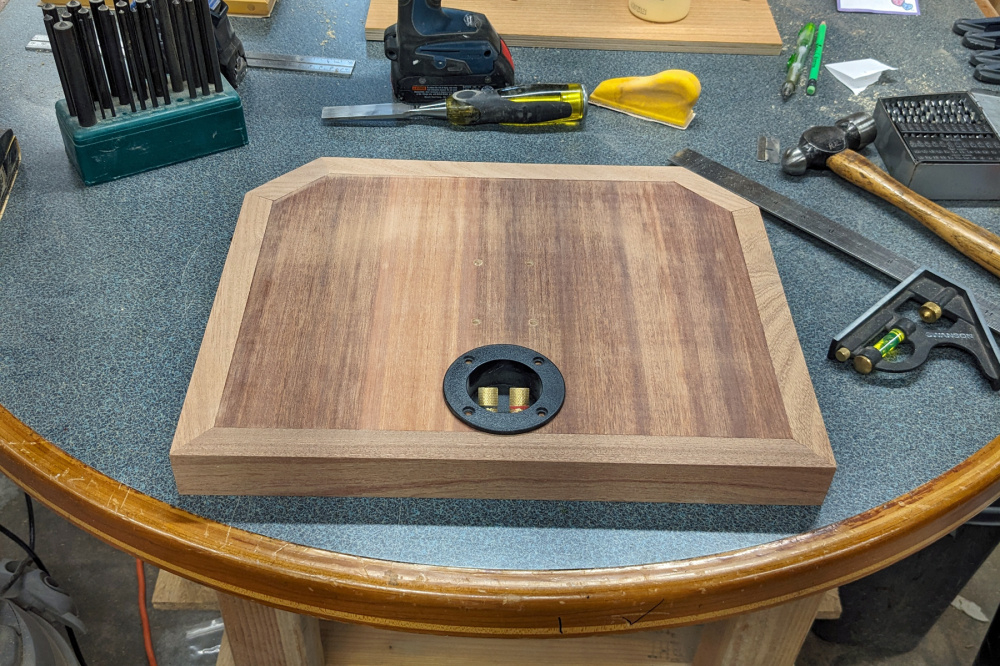
Finishing the bases.
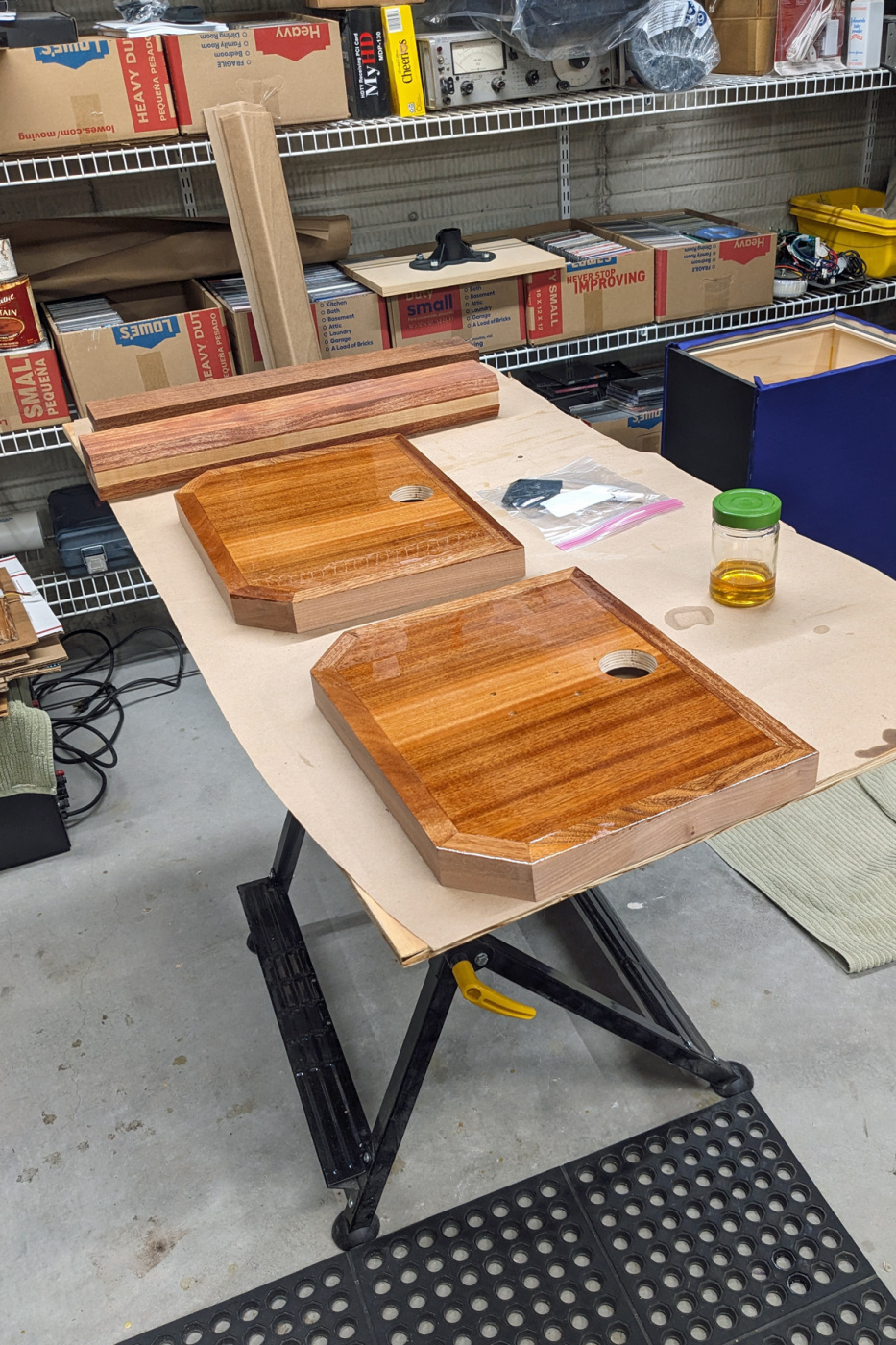
Finishing the bottoms of the bases.
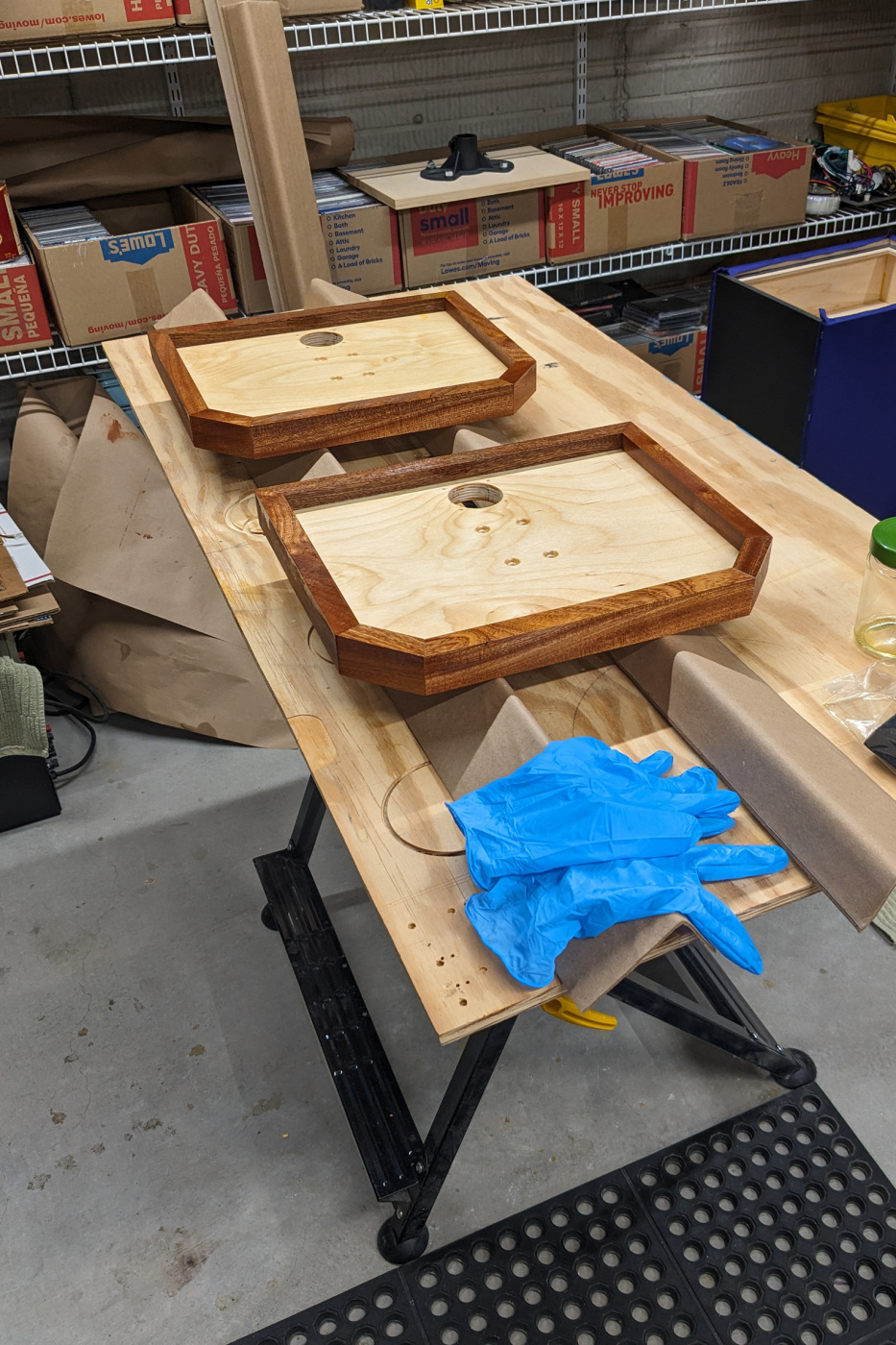
I should be able to put a couple coats of poly on next week and they'll be ready to go.
WOW
Beautiful work as usual Ron!
Ron makes it all look so simple and easy . . .
Excellent, as always! Even your stands look like high-end furniture.
Beautiful dude!
One is finished.
Putting on Poly.
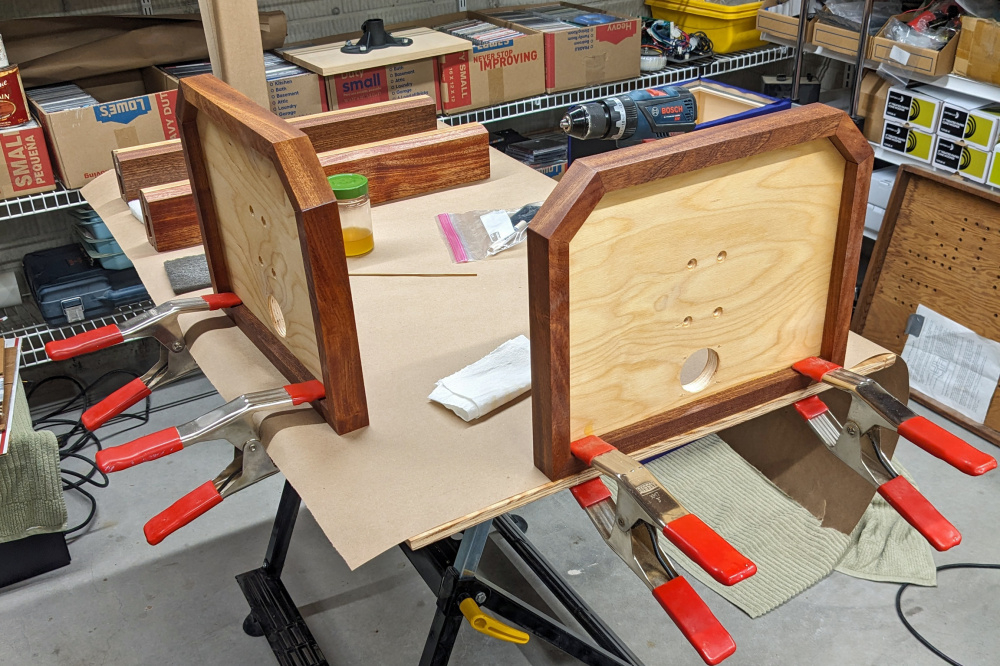
Finished vs bar stool.
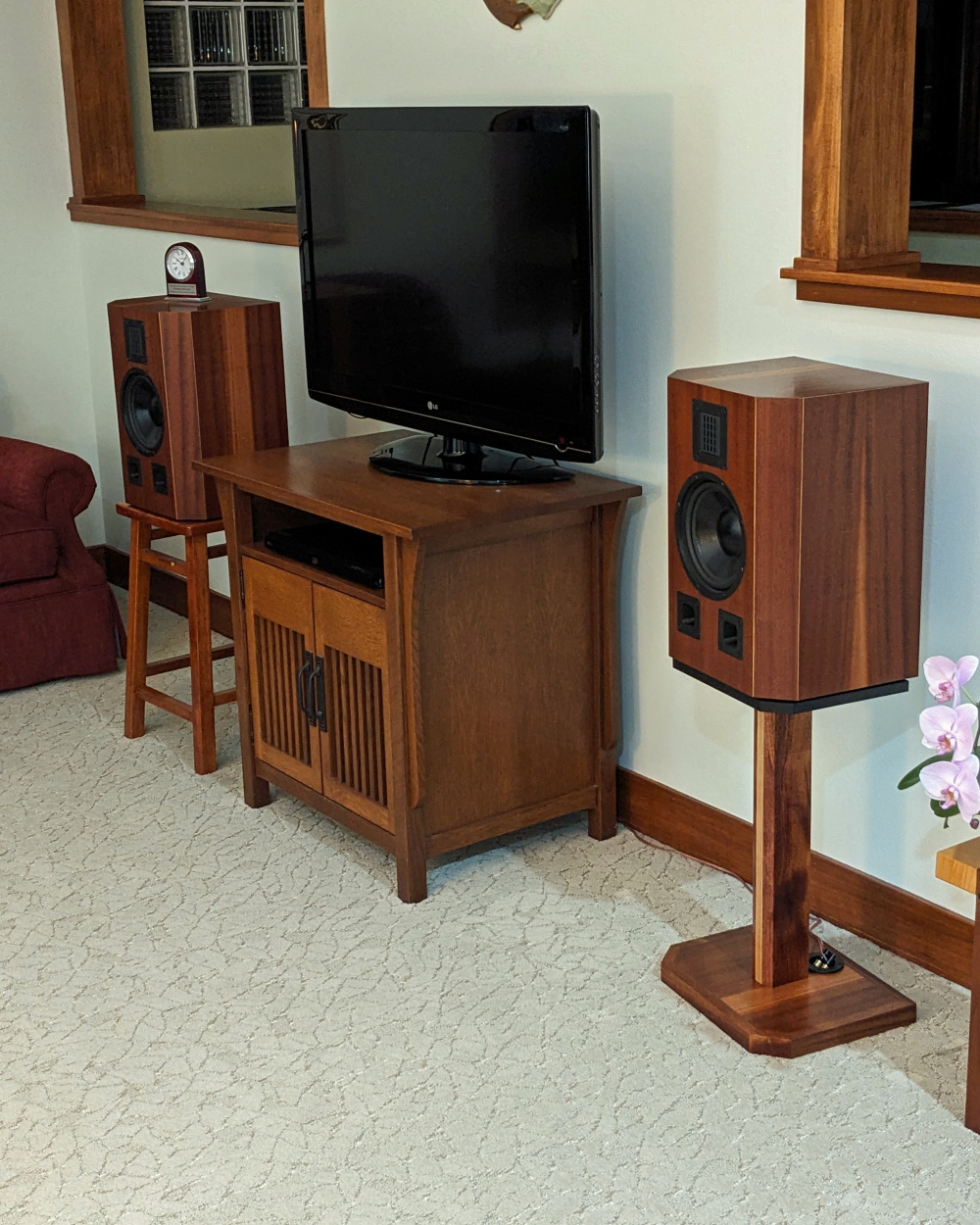
Ron
Nicey nice!
Ron, I’m considering using the DCS205’s in a smallish sealed format (in a 3 way with an open backed 6.5 inch coax, and a bit of eq). I’ll be bi-amping (coax with passive, woofer to coax active - my goto set-up) and I was wondering how your experience with these woofers has been, and how do they react/ sound when pushed a bit?
I really like this woofer. I'm running it with a 35 w/ch receiver so I never push it real hard but in a my ported box the bass gets down there.
I'm actually putting an active sealed system together for my BIL using this woofer. He's going to build the cabinets and I'll handle the rest. I've run some numbers and built a test box.
This is my sim for 3/4 cu. ft. with 150 watts in.
This is spreadsheet for a Linkwitz transform that I'll try using a MiniDSP 2x4HD.
The plan is for a TWW using the big Heil AMT1 driver, MiniDSP and 6 channels of a 75 w/ch Onkyo surround receiver. I bought the woofers for $64 each when PE was having a 15% off deal and I got a break for buying 4. I picked up the Heil's when they were 1/2 off. My BIL seems to be in no hurry to build cabinets.
Ron
Excellent info- thanks !
With 6 channels, thoughts on the lower second W running as a .5?
Ron, which spreadsheet is that forthe Linkwitz transform? Do you have a link?
Also, how does what is shown in the graph translate to the mini DSP?
Check:
https://audio.claub.net/software/LTwithMC/LTwithMC.html
I got the spreadsheet from the Minidsp forum.
https://minidsp.com/applications/advanced-tools/linkwitz-transform
This link explains what the software does and how to enter it into the Minidsp. One thing I would add to that is that you can get F3 and system Q using DATS if you have one.
I had not considered running one of the woofers as a .5.
Ron
One thing I would add to that is that you can get F3 and system Q using DATS if you have one.
Won't DATS give the box tuning? Would it also take into account the transform? Not sure how to take DATS measurment with MiniDSP. Usually I takea DATS measurement after putting in the drivers in the box, stuffing and ports to see if the valley is similar to the box desing. Are you looking at doing something else with DATS?
I was pointing out that you could measure F3 and Q to use in the spreadsheet instead of trying to estimate them by comparing the FR to the graph supplied in the writeup. You verify that the transform is working by measuring the FR with and without the transform.
I have played around with the Minidsp and the test box. This is the NF FR with and without EQ. It's not right because I needed to include BSC and I didn't but you get the idea.
Ron